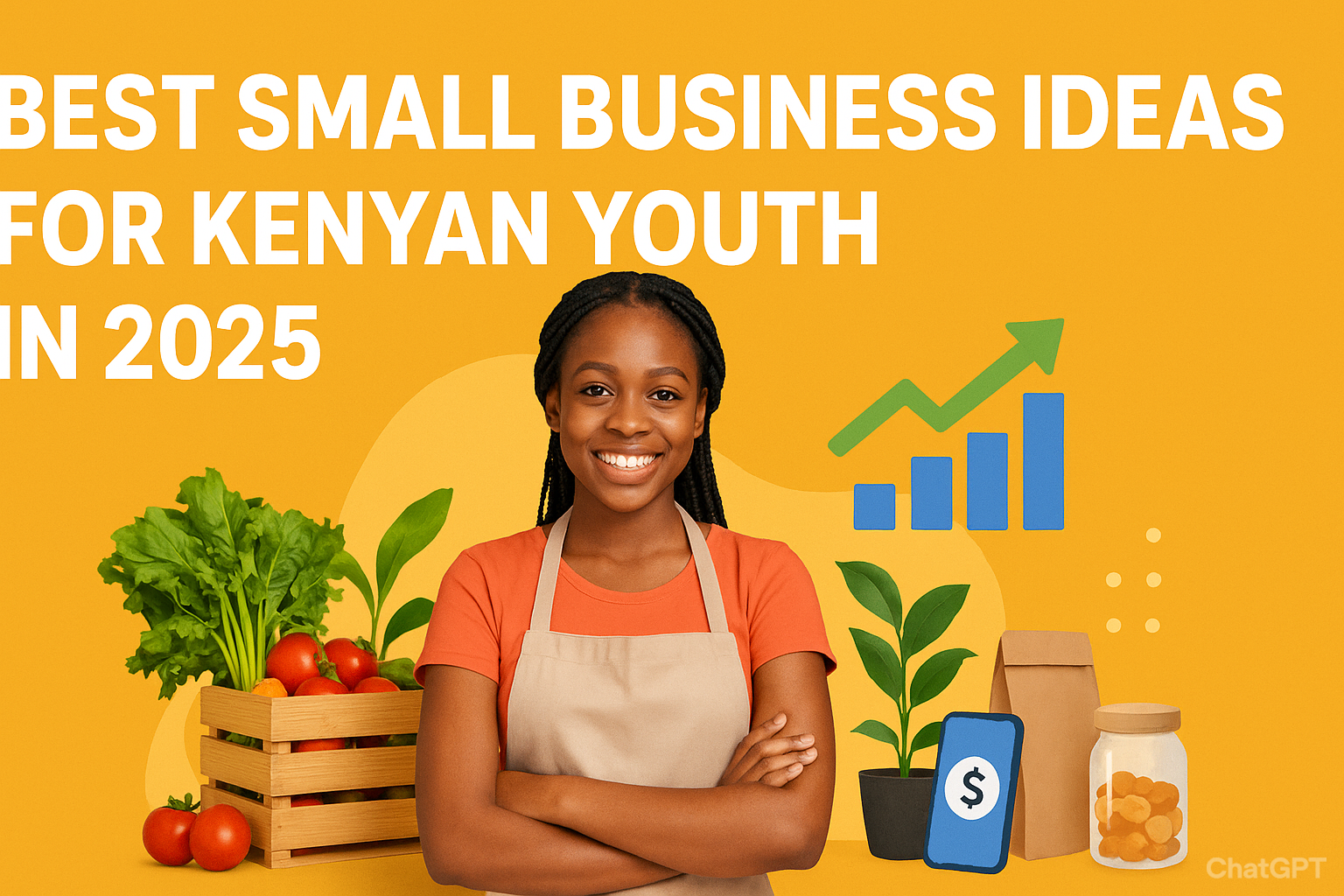

Titus Morebu
Author
Best Low-Cost Business Ideas for Kenyan Youth in 2025 – High ROI & Impact
Need profitable small business ideas in Kenya? From agribusiness to tech hustles, here are youth-friendly, low-capital ways to build income and impact.
Why Youth Businesses Matter Now 💡
With rising youth unemployment, inflation pressures, and shifting economic patterns in Kenya, young people are turning to entrepreneurship not just as a fallback, but as a pathway to innovation, resilience, and economic growth. Government initiatives like the Kenya Youth Employment and Opportunities Project (KYEOP) show that well-structured support can help youth start sustainable businesses.
The advantages of starting small with lean investment include quicker returns, lower risk, flexibility, and the ability to scale. Let’s explore the most promising small business ideas in Kenya for youth in 2025, especially those you can start with modest capital.
Key Success Factors Before You Begin
- Market research: Know what people in your community or target area need and what they are willing to pay for.
- Lean startup model: Start small, test pricing, products or services, improve based on feedback before scaling.
- Access to finance: Explore grants, microfinance, youth-focused funds, crowdfunding, or informal savings groups.
- Regulation & compliance: Be aware of licensing, permits, health & safety or other legal requirements to avoid shutdowns or fines.
- Digital adoption: Use mobile money (like M-Pesa), social media marketing, and online platforms to reach wider audiences affordably.
- Sustainability & innovation: Find ways to reduce waste, use local materials and offer value that sets you apart.
Top Small Business Ideas for Youth in Kenya (Low to Moderate Startup Cost)
Agriculture & Food Value Chain 🍅
- Vegetable gardening / kitchen gardens: Grow fast-yield crops like sukuma wiki, spinach, tomatoes or herbs. High demand in urban markets. Use small plots or container farming.
- Poultry / egg production: Broilers or layers for local sale. Eggs are always in demand and broiler meat can serve restaurants and hotels.
- Value-added food products: Processing fruits into juices, jams or drying fruits; preserving local foods with good packaging for local or export markets.
- Aquaponics / fish farming: For areas with water access, fish farming is increasingly viable; combining with vegetable farming uplifts returns.
Trade, Retail & Physical Services 🛒
- Fast food kiosk / street food: Affordable, mobile, trending food; ideal spots near schools, offices or markets. Local staples sell well.
- Mobile phone accessories & repair: Covers, chargers, screen repairs—constant demand everywhere.
- Mitumba / second-hand clothing: Buying affordable clothes and selling retail or online; requires good sourcing and sorting.
- Laundry & ironing services: Urban households and students often lack time; offering pick-up/drop-off adds value.
- Beauty, grooming & barbershops: Mobile barber services, salons, nails, natural skincare—all growing sectors in Kenya.
Digital & Creative Economy 🌐
- Online freelancing: Graphic design, copywriting, virtual assistance, translation; platforms like Upwork, Fiverr connect with global clients.
- Blogging / Vlogging / Content creation: Travel, food, lifestyle, tech reviews; monetization via ads, sponsorships, affiliate marketing.
- Social media management: Many small businesses need help with their online presence; offering to manage content, ads, and engagement.
- Tech services & support: Basic website development, app development (entry level), troubleshooting & maintenance services.
Transport & Mobility Services 🚗
- Bodaboda / motorcycle taxi business: Very high demand in peri-urban and rural areas; pairing with safe‐ride apps gives added trust.
- Delivery services / courier: With growth in eCommerce and food delivery, there’s demand for last-mile delivery services.
Green, Social & Waste Economy 🌱
- Waste collection, recycling and upcycling: Collect plastics, paper; reuse or turn into arts/craft, furniture; local demand rising with environmental consciousness.
- Urban farming / vertical farming: Grow vegetables or mushrooms in urban spaces; organic produce tends to fetch premium.
- Renewable energy & solar services: Selling solar lamps, installing panels in off-grid or low-electricity areas; maintenance & after-sales service.
Estimating Startup Cost & Profit Margins
| Business Type | Estimated Startup Capital (KES) | Expected Profit Margin / Return Timeframe |
|---|---|---|
| Mitumba stall / second-hand clothing | 15,000 - 50,000 | Markup 100-300%; can break even in < 2 months if good location & stock |
| Home-based baking / value-added food | 30,000 - 70,000 | Profit margin ~50-70%; growing as brand and volume increase |
| Fast food kiosk | 20,000 - 60,000 | Daily earnings can be 5,000-15,000; payback of initial investment in weeks |
| Online freelancing / content creation | Minimal fixed costs; mostly internet & tools | Returns depend on skill; potential for earning in foreign currencies |
| Renewable energy products / solar services | 50,000 - 200,000 | Medium-term returns; premium pricing where electricity infrastructure is weak |
How to Build & Grow Your Business Faster
- Leverage incubation & accelerator programs: Kenya has many youth support programs that offer training, mentoring, grants or low-interest loans.
- Form partnerships: Work with local suppliers, artisans, schools, restaurants to expand reach and reduce costs.
- Use online marketplaces: Sell on local platforms or export via international ones; leverage social commerce (e.g., Instagram, TikTok, Facebook Marketplace).
- Branding and customer service: Attractive packaging, punctuality, hygiene, transparency in pricing help you stand out.
- Continuous learning: Stay updated on digital tools, market trends, government regulations and consumer preferences.
Challenges to Prepare For & How to Mitigate Them
- Access to finance: Some ideas need more capital than you expect; look for microloans, youth grants, angel investors.
- Regulatory hurdles: Licensing, permits, health approvals can be burdensome — get good advice or use support networks.
- Competition & market oversaturation: Many people try the same ideas; differentiate by quality, service, location or niche.
- Supply chain disruptions: For agriculture, food, or imported goods, disruptions or delays can eat into profits; source multiple suppliers or local inputs.
- Technology & internet access: Reliable internet and digital tools matter for many ideas — plan for backup or low-tech alternatives.
Resources to Help You Start
- Kenya Youth Employment & Opportunities Project (KYEOP) — grants, training & resources for youth entrepreneurs.
- EU Global Gateway’s Young Businesses Support — funding, ecosystem building for early stage ventures in Kenya.
- Konza Technopolis — digital innovation hub, incubation, infrastructure for tech-driven businesses.
Conclusion
For Kenyan youth, the best small business ideas are those that match existing skills or passions, serve genuine local needs, and can be started with lean investment. Whether in agribusiness, retail, digital services, or green economies, there are many avenues to build sustainable businesses in 2025. Start small, plan wisely, keep learning, and aim not only for profit, but for long-term impact. You’ve got what it takes to create real change in your community. 💪
Gallery

Related Articles
3 articles
Electrical & Internet Installation Business in Kenya: How to Launch & Succeed 💡
Build a profitable electrical + internet installation business in Kenya: from market analysis, service mix, licensing, operations, marketing, to scaling for sustainable growth.

How to Sell Fresh Juice & Snacks in Residential Estates – Ultimate Guide
Discover how to launch and grow a thriving fresh-juice and snack business in estates: location, menu, pricing, marketing & logistics all covered.

How to Earn Money with Affiliate Marketing in Kenya: Your 2025-Ready Roadmap 💡
Learn how to make money through affiliate marketing in Kenya by choosing the right niche, joining solid programs, driving traffic, and getting paid—all step by step.